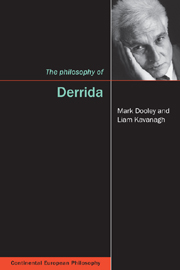Book contents
- Frontmatter
- Contents
- Preface
- Abbreviations
- 1 The catastrophe of memory: identity and mourning
- 2 Death and différance: philosophy and language
- 3 Repetition and post cards: psychoanalysis and phenomenology
- 4 The risks of negotiation: ethics and politics
- Afterword
- Notes
- Suggestions for further reading
- References
- Index
4 - The risks of negotiation: ethics and politics
- Frontmatter
- Contents
- Preface
- Abbreviations
- 1 The catastrophe of memory: identity and mourning
- 2 Death and différance: philosophy and language
- 3 Repetition and post cards: psychoanalysis and phenomenology
- 4 The risks of negotiation: ethics and politics
- Afterword
- Notes
- Suggestions for further reading
- References
- Index
Summary
The work of mourning is always an ethics and a politics of memory. As we have seen, the archive preserves the memory of the past while affirming the fact that memory is always selective and incomplete. There is no such thing as a neutral archive. This means that the question of memory is also a question of responsibility. How we think about identity and the past determines how we think about justice and the future. How we archive the identity of the holocaust, for example, determines our commitment to render justice to the dead. All identity is archival, which means the question of identity is inextricably tied to the ethical and the political.
It has been argued that one can discern a decisive shift or turn towards ethical and political themes in Derrida's later work. Many commentators have attempted to identify an “early Derrida”, who concentrated primarily on philosophical and literary texts, and a “later Derrida”, for whom the ethical and the political play a central role. But this attempt to identify a theoretical “turn” in Derrida's work fails to take account of the primary role that the ethical and the political have played in Derrida's texts from the very beginning. As we have argued, Derrida's entire body of work can be comprehended as a work of mourning. The work of mourning is essentially the desire to do justice to the other.
- Type
- Chapter
- Information
- The Philosophy of Derrida , pp. 107 - 148Publisher: Acumen PublishingPrint publication year: 2006

